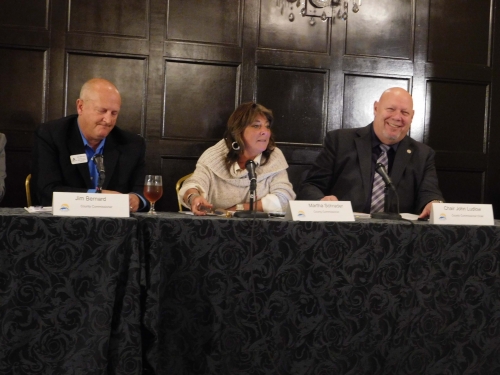All Five Clackamas County Commissioners appeared at the annual Business in the County event that the North Clackamas Chamber held on October 28th. This event was Moderated by Lori Olund with Miles Fiber Glass & Composites at Gray Gables Estate in Milwaukie; it was a great opportunity for the audience to ask many questions. Watch the video to understand where the Commissioners stand on transportation, waste water issues, marijuana zoning and regulations and much more.
We would like to thank the County Commissioners for taking time out of their busy days to have this panel to discuss these matters with the local business community. Chair John Ludlow, Commissioner Martha Schrader, Commissioner Paul Savas, Vice Chair Jim Bernard, and Commissioner Tootie Smith.
Marijuana in Clackamas County
Since industrial areas are in short supply in Clackamas County, “Why would we sacrifice that to this industry?” Savas said.
“We have varying opinions as to whether marijuana should be in industrial areas,” Bernard said. “We’re trying to be careful to preserve Clackamas County the way it is.”
“Recreational use of marijuana should not be a crime,” Commissioner Savas said was the primary goal of local voters. However, he added, “Growing pot not done properly creates problems” that the commission is working to avoid.
Clackamas County Planning Commission hearings on marijuana are scheduled in the coming month.

Land Development in Clackamas County
Schrader acknowledged that Clackamas County has a shortage of employment land. However, she said the county has a great economic development team to help developers find shovel-ready sites. The team also identifies future land-use needs and what rules might need to change to accommodate new development.
“I do think this county will be successful,” Schrader said.
Standing with Schrader on the issue, Commissioner Jim Bernard said if “we keep creeping out into our valuable farmland,” it would be at the cost of ignoring available land that’s underdeveloped and well-served by public transportation and other transportation infrastructure.
“McLoughlin Boulevard is an opportunity that is not unlike Kruse Way,” Bernard said.
“There are no 50 or 100-acre sites on McLoughlin,” Savas retorted, although he agreed that there were some good opportunities on the thoroughfare.
“None of us can even imagine,” Bernard argued, what the future of business needs will be, so he called into question county commissioners who argued that the county needed flat contiguous sections of land for development.
“Are we planning for the future or are we just looking at the status quo?” Ludlow asked.
Read the full article by the Clackamas Review Here.
